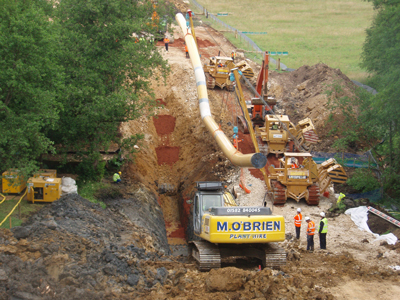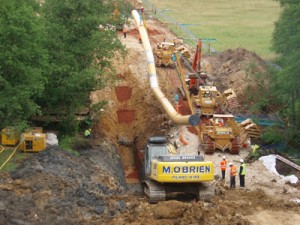Government Aids Big Oil In Confiscation Of Private Land For Fracking Pipelines
August 21-2013
Manufactures Drill Pipe Elevators Same Day Quotes, Expedited Shipping
In the quest for profits, nothing stands in the way of corporatocracy, not even your own private land. Federal and state governments have revised laws so that corporations can now use “eminent domain” to install hydraulic fracturing (fracking) infrastructure on private property, with or without landowner consent.
Bob Swartz was informed by the Central New York Oil and Gas company that they will cut a 50-foot wide, 400-foot long gash through a stand of ancient trees in his front yard. When Mr. Swartz suggested an alternate route in an open field, the company arrogantly responded by saying they would pay for the wood from the felled trees.
A 2012 federal decision in the “public interest” allowed Tennessee Gas Pipeline Co. to use eminent domain to take property from an 87-year-old New Jersey man and his wife, before compensation was received, for the construction of a natural gas pipeline. Even though construction permits had yet to be approved, the company began cutting down trees directly behind the couple’s home.
How did we get to such an outrageous situation? Eminent domain, or the taking of private land for public use, has long been used by government under the Fifth Amendment’s “takings” clause. But over the last century, courts have expanded the definition of “public use” to include economic development. And in 2005 the U.S. Supreme Court put the nail in the coffin by ruling that the city of New London, Connecticut could take private property and give it to another private entity for economic development.
In the view of corporatocracy, the profits of oil and gas companies and the resulting tax revenues for government are enough “economic development” to justify the confiscation of private property.
When an oil and gas company is planning a pipeline route there are several options. It can find an alternate route around sensitive areas or it can bore the pipeline underneath the land or waterway with no impact to the surface. However, these methods often cost the company more money. So instead of spending more money, it can call its desired route “economic development” in the public interest, claim eminent domain, and bulldoze right through a person’s private property.
In the past, landowners have been paid just compensation under a fair negotiation between the two parties. However, since government has granted oil and gas companies eminent domain power, landowners now typically receive far less compensation than they would without eminent domain.
Several states also have laws that allow land grabs by the oil and gas industry, including West Virginia, Utah, Washington, North Carolina, Pennsylvania, and Texas, the latter two having huge fracking potential.
The oil and gas industry has spent at least $29 million in Pennsylvania on campaign contributions and lobbying efforts, including $1.8 million to Governor Tom Corbett who signed a bill into law on February 14, 2012 that allows corporations to take private property for “injection, storage and removal from storage of natural gas.”
Unsurprisingly, Texas has an extremely favorable environment for oil and gas companies to take private land. Even while Governor Rick Perry signed a bill into law curbing some uses of eminent domain, he and lawmakers explicitly exempted oil and gas pipelines. It is a simple exercise for a corporation to become a “common carrier” and enjoy the privilege of private land confiscation. There is even a bill under consideration that would leave local governments powerless to stop drilling or fracking.
In addition to environmental and public health dangers, fracking poses a threat to the very concept of private ownership. In Orwellian fashion, the public interest is held up as the reason for this public theft

